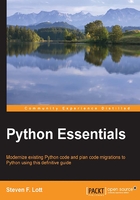
Chapter 4. Variables, Assignment and Scoping Rules
An expression creates objects; we can assign objects to variables to preserve them for future use. Python offers a number of variations on the theme of assignment. In addition to simply assigning a single variable, we can assign items from a tuple to multiple variables. We can also combine an operator with assignment, which updates a mutable object.
In this chapter, we'll also look at the input() function as a way to introduce new objects into a running script. This is limited—it doesn't compare with a proper graphical user interface (GUI). It will, however, help us learn more Python programming techniques before we introduce how to read data from files and the filesystem in Chapter 10, Files, Databases, Networks, and Contexts.
We'll also look at some important Python language concepts. We'll look at the way Python programs are always written generically, without specific bindings to data types or classes. We'll also look at the general concept of a namespace, and how this is applied widely in various Python language constructs. It defines the scope in which an identifier is visible; something that will become increasingly important as our programs become more complex.